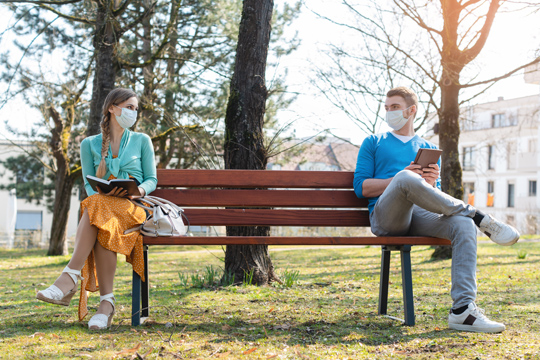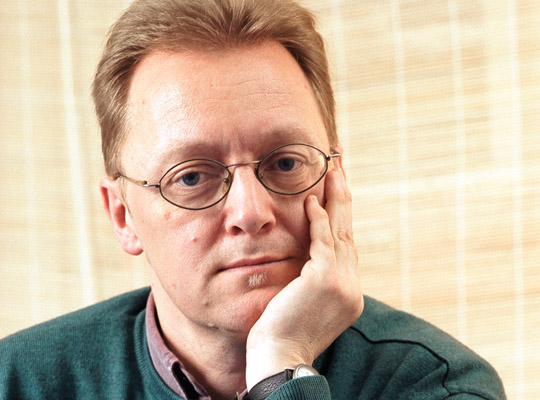Viewed in Perspective: the World after Corona
Freiburg, May 28, 2020
What will the world look like after the corona crisis? What effects will the pandemic have on the future? Questions like this are at the heart of futurology: the science that studies developments in the fields of technology, economics and society. To do this researchers combine data on the past with knowledge of current structures. Sarah Schwarzkopf talked to futurologist Prof. Dr. Michael Schetsche from the Institute of Sociology at the University of Freiburg. He is particularly concerned about the ideas that some people have about how we need to deal with the old and the ill.
 If people constantly regard others as a risk this places a great stress on the psyche. Photo: Kzenon/stock.adobe.com
If people constantly regard others as a risk this places a great stress on the psyche. Photo: Kzenon/stock.adobe.com
Mr. Schetsche, people all round the world have been living in an exceptional situation for months now. Will everything just go back to how it was once the corona crisis is over?
Michael Schetsche: I keep hearing two opposing theories in the media: nothing will be the same again after corona, and: basically nothing will change. I think both theories are wrong. Most social structures will still be the same after the crisis as they were before it. But there are already signs of some major changes: in the field of the economy and the working world, in the health sector and in the education system. And not least in the collective psychological structures of our society.
How can futurology help us to cope with a situation like this?
My method is scenario analysis, which involves me using key factors to forecast various potential developments: “If we do this, things will develop in this direction – or if we do that it will take a totally different course”. Futurology attempts to prevent negative developments occurring by providing warning forecasts. It always depends on society’s actions how things turn out. History doesn’t happen, it is made by the human collective.
What changes are you expecting, for example?
One of the greatest changes concerns working life. We already have all the technology to work successfully from home, and it was possible within a few weeks to convert almost a quarter of all jobs to home office working. Before this many thought that was unrealistic. So this is an insight we can’t forget now. We will feel the effects for a long time, especially in the number of people commuting for work. This will have considerable ecological benefits, but also positive effects on the time available to employees. Long term it could lead to a major restructuring of the work environment.
There are a lot of innovations in the education system too.
I regard the situation for schools and education critically: we’re experiencing forced digitization – but the consequences of this transition are unclear. The crisis shows that knowledge can in some cases be passed on successfully via online media. But there are sound didactic reasons for classroom teaching. We have to watch out not to lose valuable forms of teaching and learning in the exuberance of over-optimistic digitization. Educational investments can also lead to regression rather than progress: when traditional blackboards are replaced with interactive whiteboards there’s often no longer a wash basin in the classroom – something essential in the days of chalk and blackboard rubber.
 “We have to take care about what we think of the weakest members of society,” warns sociologist Michael Schetsche. Photo: Michael Schetsche
“We have to take care about what we think of the weakest members of society,” warns sociologist Michael Schetsche. Photo: Michael Schetsche
You say you expect changes in our collective psychological structures. What do you mean by that?
For the first time in this generation we’re confronted with such a massive health risk. This can lead to our perception of our fellow humans being dominated more by risk than it was. This could lead to changes in our daily behavior: How large is the average distance we leave when we talk together in the street? Will shaking hands still be an important greeting ritual? Who will we still hug in everyday life?
Can a crisis like this even change such habits long term?
There were changes in everyday behavior in the plague, cholera and flu epidemics of previous centuries: wearing a mask, keeping your distance, meeting very few people. Greetings rituals also changed markedly. So I believe the changes will be more striking the longer the crisis lasts. A whole year could change our approach to one another for many years. Nevertheless, daily rituals and habits are also very stable over time. It could be that after a few years everything settles back just as it was before the corona crisis. People forget quickly.
What does it do to our psyche if we see our fellow humans as a risk and reduce physical contact?
We suffer from both. One makes us permanently mistrustful, changes our perception of the world and how we move through our environment: more cautiously, always on guard, never getting close to someone. In the long run that brings with it considerable stress day to day. Reducing physical contact also has a negative effect. Contact is part of our most important social activities. Without it children get ill. It doesn’t suit adults either – our hormone system is designed massively for contact.
How does the crisis influence our solidarity?
At present positive and negative effects are balanced. On the one hand we have the sense of all being in the same boat. That strengthens solidarity. On the other there are contributions to the debate that point entirely the other way: one thing that concerns me deeply is a new intellectual approach to elderly and sick people – even among politicians. We’re experiencing contempt here; a devaluation of other people unlike any we’ve seen since the end of the Nazi regime. Some see these people as a nuisance, as responsible for the restrictions in everyday life. This is a major indicator that solidarity is being eroded. I think this may be the greatest danger that could arise from the current crisis. We have to take care about what we think of the weakest members of society. Until now the right to life was part of our consensual values. The fact that some people are now relativizing it could have dangerous consequences in the future.

